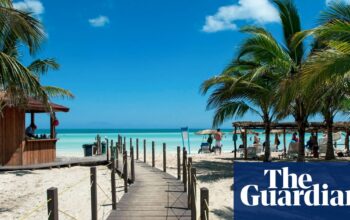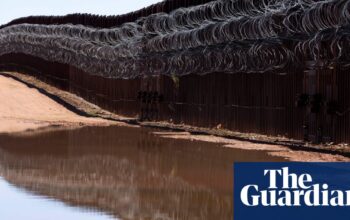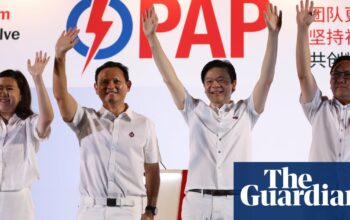The Rwandan president, Paul Kagame, is gearing up for a fourth term in office after winning a thundering 99.15% of the vote in an election where only two challengers were allowed to run against him.
The outcome of Monday’s poll was never in doubt, with Kagame ruling the small African country with an iron fist as de facto leader then president for three decades.
Partial results issued by the election commission seven hours after polls closed showed Kagame had surpassed the 98.79% of the vote he got in the previous election seven years ago.
The Democratic Green party candidate, Frank Habineza, mustered only 0.53% and the independent Philippe Mpayimana 0.32%, according to the results issued with 79% of ballots counted.
In an address from the headquarters of his ruling Rwandan Patriotic Front (RPF), Kagame thanked Rwandans for giving him a further five years in office.
“The results that have been presented indicate a very high score, these are not just figures, even if it was 100%, these are not just numbers,” he said. “These figures show the trust, and that is what is most important. I am hopeful that together we can solve all problems.”
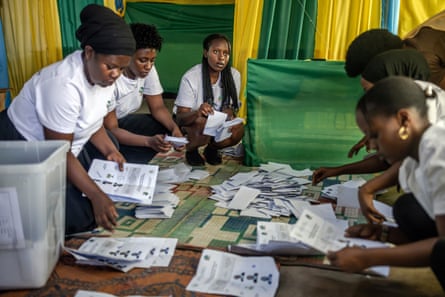
Full provisional results are due by 20 July and definitive results a week later. With 65% of the population aged under 30, Kagame is the only leader most Rwandans have known. The 66-year-old is credited with rebuilding a traumatised country after the genocide but he is also accused of ruling in a climate of fear at home, and fomenting instability in the neighbouring Democratic Republic of the Congo.
More than 9 million Rwandans – about 2 million first-time voters – were registered to cast their ballot, with the presidential race being held at the same time as legislative elections for the first time.
“Kagame gives us everything we ask him, such as health insurance. This is why he wins by a big margin,” said François Rwabakina, a 34-year-old mechanic.
Kagame won with more than 93% of the vote in 2003, 2010 and in 2017, when he again easily defeated the same two challengers. He has overseen controversial constitutional amendments that shortened presidential terms from seven to five years and reset the clock for the Rwandan leader, allowing him to rule potentially until 2034.
Rwandan courts had rejected appeals from prominent opposition figures Bernard Ntaganda and Victoire Ingabire to remove previous convictions that in effect disqualified them from Monday’s vote.
The election commission also barred the high-profile Kagame critic Diane Rwigara, citing issues with her paperwork, the second time she was excluded from running.
The imbalance between the candidates was evident during the three-week campaign, as the well-oiled PR machine of the ruling RPF swung into high gear. The party’s red, white and blue colours and its slogans were widespread. His rivals struggled to make their voices heard, with barely 100 people showing up to some events.
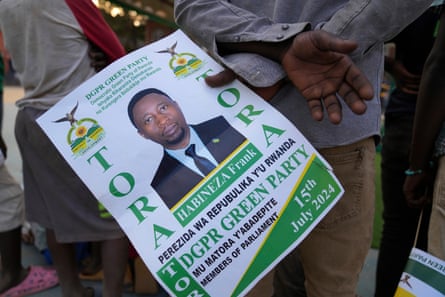
Despite the lacklustre turnout at his rallies, Habineza hailed the “free and fair atmosphere”. “This is a very good show of the level of growth in democracy in our country. We have been able to campaign [across] the whole country,” he told Agence France-Presse.
Kagame’s RPF militia is lauded for ending the 1994 genocide when it marched on Kigali – ousting the Hutu extremists who had unleashed 100 days of bloodletting targeting the Tutsi minority. The perpetrators killed about 800,000 people, mainly Tutsis but also Hutu moderates.
Kagame has overseen a remarkable economic recovery, with GDP growing by an average of 7.2% a year between 2012 and 2022, although the World Bank says almost half the population lives on less than $2.15 a day.
Before the vote, Amnesty International said Rwanda’s political opposition faced “severe restrictions … as well as threats, arbitrary detention, prosecution, trumped-up charges, killings and enforced disappearances”.
Abroad, Kigali is accused of meddling in the troubled eastern DRC, where a UN report says its troops are fighting alongside M23 rebels.
He was also accused of killing tens of thousands of Hutus in the DRC during its pursuit of fleeing genocide perpetrators. Discussion of these alleged massacres remains taboo and is considered genocide “revisionism” in Rwanda.
In the parliamentary election, 589 candidates were chasing 80 seats, including 53 elected by universal suffrage. In the outgoing assembly, the RPF held 40 seats and its allies 11, while Habineza’s party had two.
A further 27 seats are reserved for women, young people and disabled people.
Source: theguardian.com
